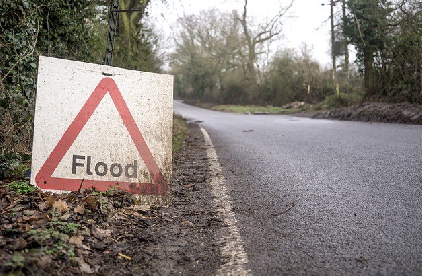
People in a Herefordshire village that was devastated by flooding 18 months ago say attempts to better protect their homes are being thwarted by council planners.
About 50 homes in Wellington were flooded in the wake of storms Ciara and Dennis in February 2020, the latest in a succession of floods to hit the area.
In response, environmental charities Herefordshire Wildlife Trust and the Wye and Usk Foundation proposed three floodwater-holding ponds on fields by the Wellington Brook within Derndale Farm west of the village.
These would hold up to 3 million gallons when the flash flooding-prone brook is at peak flow, so reducing potential impacts of these downstream.
The ponds would not otherwise affect the flow of the brook – but would “provide a wonderful habitat for amphibians, reptiles and wading birds, helping to improve wildlife connectivity across the farm”, according to a supporting statement with the bid.
The plans are backed by the Environment Agency, which would pay 80 per cent of the likely £50,000 cost.
But puzzlingly to its backers, council planners this month judged the proposal as “not reasonably necessary for the purposes of agriculture”.
Local resident Nick Jones said: “We all thought it would go through.
“We will now have to go through full planning, which could take three to six months, in which time we could have another flood. We are still getting our own house back in shape after the last one.”
He added: “The landowners on both sides of the brook are supportive, the agencies have all given it the green light and the contractor is ready to go. It’s so frustrating.”
Mr Jones and four other residents sought the backing of Herefordshire Council chief executive Paul Walker when he addressed Wellington Parish Council earlier this week.
“He said he was aware of the issue, but didn’t stay to take questions on it,” Mr Jones said.
Yet what is being proposed is very much in line with the Government’s thinking nationally, he pointed out.
The forthcoming Environment Bill will make drainage management planning a statutory duty, while future Environmental Land Management payments will cover measures “to prevent, or reduce the risk and impacts of, flooding”, official guidance says.
Meanwhile, further guidance to local authorities this month from professional bodies the Royal Town Planning Institute and the Town & Country Planning Association urges planners to “recognise how vital planning is to tackling the climate crisis… through practical nature-based solutions to promote natural flood defence”.
A Herefordshire Council spokesperson said: “Herefordshire Council can legally only make decisions in line with current legislation, not on legislation which has not yet been implemented.
“However we will work with the applicants to look at their options in terms of the requirement for planning permission for the works to resolve this matter as quickly as possible.”
Coun Elissa Swinglehurst, who chairs the River Lugg Internal Drainage Board whose area includes Wellington, said she welcomed this and other proposals for natural food defences.
“But it’s not a a small project and we want to be assured the design won’t have adverse impacts downstream, including on habitats,” she said.
“We need to see the detail that a planning application would bring.”


 Hereford bypass construction ‘on track’
Hereford bypass construction ‘on track’
 Fury at failure to prepare for defence investment
Fury at failure to prepare for defence investment
 Appeal following collision between car and pedestrian in Herefordshire
Appeal following collision between car and pedestrian in Herefordshire
 Controversy over £13m Hereford school expansion
Controversy over £13m Hereford school expansion
 Revealed: The main roads in Herefordshire prioritised for repairs
Revealed: The main roads in Herefordshire prioritised for repairs
 Appeal to find missing Monmouthshire man
Appeal to find missing Monmouthshire man
 Man arrested in connection with stabbing incident
Man arrested in connection with stabbing incident
 New Food and Drink group launched at online event
New Food and Drink group launched at online event
